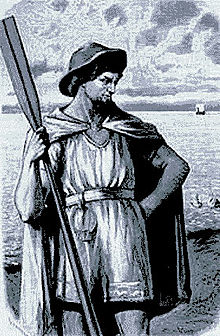Njörðr
Njörðr (also called Njörd or Niördr ) is one of the Wanen in Norse mythology .
swell
The god Njörðr is mainly known from the Snorra Edda , the Ynglinga saga and some Edda songs (Vafþrúðnismál, Lokasenna, Grimnismál ), i.e. the learned mythography of Snorris from the high Middle Ages . There are also a few ritual formulas in which his name appears. In Aris Íslendingabók , Njörðr is the second name in the Ynglinga genealogy. The name Nerthus, handed down by Tacitus, is associated with this form of name .
Place names, which mostly use the genitive singular ( Njarðar -), are mainly represented in eastern Sweden (Östergötland), in eastern Norway and in the coastal areas of western Norway.
The connection between Nerthus and Njörðr poses problems because Tacitus is a goddess whom he assigns to a smaller tribal group within a narrowly defined geographical area. In addition, there is the great time lag between Tacitus and the Scandinavian sources. There Njörðr is a male god. There are a number of theories about these problems. Sometimes Nerthus had gradually spread to Scandinavia, sometimes it was an all-Germanic god from the start. In the past, the u-declension for masculine and feminine words were the same, but the feminine u-declension gradually died out in Scandinavia, which then made Nerthus the masculine god. It is also argued that it was actually a pair of gods, of which only the important Nerthus was mentioned in Tacitus. In the Edda, the male partner came to the fore, and the female was changed to Skaði . Recently this connection between Nerthus and Njörð has been questioned (Simek, p. 147; Motz).
Njörðr myth
In the euhemeristic context, Njörðr is an ancient king, with Snorri the second after Oðin . In Ari froði's family tree of the Ynglingen family , his father is not Oðin but Yngvi Tyrkja konungr . Oðin does not appear with him. This arrangement is also offered by the Historia Norvegiae ( Ingui rex ... Neorth ... Froyr ). At Snorri , Oðin installed Njörðr and Freyr as sacrificial priests. They were then rulers in a peaceful and lush time, which is why the Svear Njörðr held responsible for this rich time, so that he was elevated to the god of fertility.
Njörðr appears strangely seldom in the mythological sources. In the mythological context of Gylfaginning , Snorri Njörðr gives maritime traits. His place of residence is Nóatún , the shipyard. He ruled the winds on the sea, the sea and the fire.
"Inn þriði áss he sá, he kallaðr he Njörðr. Hann býr á himni, þar sem called Nóatún. Hann ræðr fyrir göngu vinds ok stillir sjá ok eld. Á hann shall be called to sæfara ok to veiða. … Hann var upp fæddr í Vanaheimi. "
“The third Ase is called Niörðr; he lives in the place in heaven called Noatun. He rules the course of the wind and stills sea and fire; you call him at sea and when fishing. ... He was brought up in Wanaheim. "
Njörðr was assigned to the Wanen family of gods, who were created by "wise powers" in Wanenheim. But then he came with his son Freyr as a hostage to the sir. Judging by the Edda songs, this hostage motif seems to be very old.
|
Óðinn kvað: |
Odin said: |
According to the Skáldskaparmál, Skaði from Þrymheimr is allowed to choose a husband among the gods as a penance for the murder of the sir against her father Þiazi , but can only see the gods' feet. She thinks she chose Baldr . The feet belonged to Njörðr . Snorri emphasizes that the couple were siblings and adds that such incestuous marriages were common among the Vanes but were forbidden among the Aesir.
The marriage failed because they couldn't live in the same place. They had initially agreed that Njörðr should stay nine nights with Skaði in Þrymheimr and Skaði three nights with Njörðr by the sea. But Skaði could not sleep in Nóatún because of the screeching gulls, and Njörðr could not bear the howling of the wolves. After Snorri, Njörðr later had two children, Freyr and Freya , with Egill Skallagrímsson this is not clear. The division of the times of coexistence has symbolic meaning. It reflects the annual division into 9 winter months and 3 summer months. The activity in the three summer months is related to the Vanes: seafaring, agriculture and fishing. It follows that the myth of Njörðr and Skaði comes from the western Nordic milieu.
There is also a myth shift in Lokasenna , according to which the daughters of the giant Ymir used Njörð's mouth as a chamber pot. Snorri's unsuccessful marriage with Skaði also has vague features.
Footnotes
- ↑ Folke Ström: Nordiske hedendom. Göteborg 1961. S. 33 ff., Where he refers to PV Glob : Jernaldersmanden fra Grauballe . Appointed Kuml 1956.
- ^ Translation by Simrock.
- ^ Rudolf Simek: Lexicon of Germanic Mythology (= Kröner's pocket edition . Volume 368). 2nd, supplemented edition. Kröner, Stuttgart 1995, ISBN 3-520-36802-1 , p. 294ff.
- ↑ Controversial meaning. “Regin” = regulating forces, powers. Gods. In Grímnismál verse 37, the word is explicitly referred to the sir; it is not reported that the Vanes could have created anyone. Sveinbjörn Egilsson: Lexicon poeticum. “Creating order” is usually a hallmark of the sir. Nonetheless, the meaning of “waning” is obvious from the context.
literature
- A. Hultgård, Njörðr In: Reallexikon der Germanischen Altertumskunde. Berlin 2002. ISBN 3-11-017272-0
- EF Halvorsen, Njörðr In: Kulturhistorisk leksikon for nordisk middelalder. København 1967.
- Rudolf Simek , Religion and Mythology of the Teutons. Darmstadt 2003. ISBN 3-534-16910-7
- Lotte Motz , The Goddess Nerthus: A New Approach. In: Amsterdam Contributions to Older German Studies Vol. 26 (1992) pp. 1-19.
